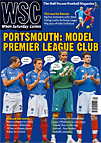 With the Berlin Wall coming down in October 1990, Paul Joyce recalls the first Bundesliga season where West Germany's teams met those from East Germany
With the Berlin Wall coming down in October 1990, Paul Joyce recalls the first Bundesliga season where West Germany's teams met those from East Germany
The long-term significance
After reunification in October 1990, this was the first season in which teams from the former GDR joined the West German football pyramid. Only two East German sides (Oberliga champions Hansa Rostock and runners-up Dynamo Dresden) were allowed into the Bundesliga, which was expanded to 20 clubs. A further six GDR clubs entered a regionalised second division.
Story of the season
Neither reigning champions Kaiserslautern nor Bayern Munich challenged for the title this year. Bayern slumped to their lowest league finish since 1978, after replacing Jupp Heynckes as coach mid-season with the inexperienced Søren Lerby.
Dismissed in advance by many Western critics, Rostock hammered Borussia Dortmund 5-1 in August and topped the table after seven matches. Yet both Hansa and promoted MSV Duisburg, who were second after 13 games, were relegated in May.
Eintracht Frankfurt, who had not won the championship since 1959, took over as pace-setters. Coach Dragoslav Stepanović built an attractive passing team around midfielders Andreas Möller and Uwe Bein, and Ghanaian striker Tony Yeboah scored 15 goals. But Möller’s protracted departure to Juventus unsettled the side. In their penultimate match, Eintracht failed to defeat an exhausted Werder Bremen, who had won the Cup-Winners Cup three days earlier.
This set up the closest finish in Bundesliga history. Frankfurt were still top, but now only on goal difference from VfB Stuttgart and Borussia Dortmund. All three clubs were away in their final match on May 16 and all to teams who urgently needed to win. With 15 minutes to go, third-placed Dortmund led 1-0 at Duisburg while their rivals were only drawing. In his first year with Borussia, Ottmar Hitzfeld looked set to guide a team that had faced relegation in 1986 to their first league title in 39 years.
In Rostock, referee Alfons Berg denied Frankfurt a clear penalty after Ralf Weber was scythed down by Stefan Böger. As Eintracht desperately pushed forward, Böger broke away in the 89th minute to make the final score 2-1 to Hansa. After this defeat, a disgusted Frankfurt sponsor threw the team’s DM200,000 (£90,000) bonus for winning the league into the air to be fought over by local journalists. Eintracht have been in decline ever since.
But there was to be one more twist in the tail. With four minutes to go in Leverkusen, Guido Buchwald headed a late winner for second-placed VfB Stuttgart, who were down to ten men after Matthias Sammer’s dismissal for dissent. Despite only having led twice during the season, Christoph Daum’s well-organised team were champions, not least due to 22 goals from Fritz Walter.
At the other end of the table, Rostock’s victory had been in vain. Wattenscheid 09 overturned a two-goal deficit to beat Borussia Mönchengladbach 3-2 and send Hansa and Stuttgarter Kickers down by a single point. Bottom club Düsseldorf went down to the third tier and back up to the Bundesliga in the next three seasons.
For the record books
In May 1992, Hannover 96 became only the second club from the second division to win the German Cup. After a goalless draw in Berlin, Jörg Sievers saved two spot-kicks to help Hannover beat Mönchengladbach 4-3 on penalties.
Same place today
Twelve of these clubs currently play in the Bundesliga, which reverted to 18 teams in 1992. After Energie Cottbus’s relegation in 2009, there are now no sides from the former GDR in Germany’s top flight.
Moved furthest away
Since the departure of their patron Klaus Steilmann, Wattenscheid 09 have sunk to the fifth tier of German football. Stuttgarter Kickers are in the fourth-division Regionalliga Süd, one level below Dynamo Dresden.
From WSC 278 April 2010